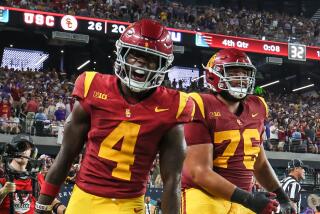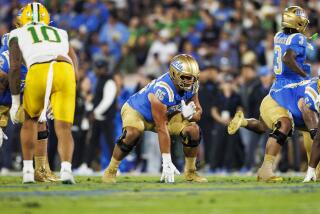At UCLA, Sophomore Quarterback Cade McNown and Junior Running Back Skip Hicks Will Be the... : FOCUS ON OFFENSE : The Question Is, Can He Stay Healthy?
- Share via
Now you see Skip Hicks . . .
. . . ripping off 40 yards for a touchdown against California in 1993, the second time he touched the ball at UCLA . . . running for 148 yards against Nebraska the next week . . . running for a touchdown against USC in a game that clinched a Bruin Rose Bowl berth, then running for 67 yards in only eight carries in the Rose Bowl game.
Now you don’t . . .
. . . because of a sprained ankle suffered at the end of a 21-yard run against Nebraska . . . and because of a torn ligament in his left knee, suffered long-jumping in a spring rain . . . and because of torn cartilage in his right knee, suffered in a dummy drill in practice.
Now you see him . . .
. . . running 52 yards for a touchdown against Oregon in his first carry after his last knee surgery.
Now you don’t . . .
. . . because the knee just wouldn’t work and a redshirt season seemed the only remedy . . . and because of a hamstring pull suffered on a chilly day on the track at Drake Stadium that cost him spring practice with a new coaching staff.
Now you see Skip Hicks--older, wiser, a junior who is in shape, perhaps for the first time since he left Wichita Falls, Texas, four seasons ago.
How long before you don’t?
“I think he’s ready to play,” says Al Borges, who had heard about Hicks, but didn’t know much about him when he took the job of Bruin offensive coordinator.
“I see it. I just have my fingers crossed. I have a good feeling about the kid. Knock wood,” Borges says, using a reporter’s head.
“I don’t want to jinx him.”
Nobody does.
UCLA coaches have, to some extent, spoon-fed Hicks since fall practice began on Aug. 17, running him in drills, but limiting contact and giving the harder work to four freshmen, Ryan Roques--who redshirted last season--Durrell Price, Jermaine Lewis and Keith Brown.
“He’s the starter,” says Lewis. “We understand that. He’s the go-to guy. If he gets injured, it will be in a game. It won’t be in a practice.”
It’s nothing Hicks asked for, and he prepared for much more, getting up at 5:30 four mornings a week all summer to lift weights and run in Westwood, instead of taking his annual two-month vacation back home in Texas. He’s added weight, to 220 pounds, but kept his 4.5-second speed.
“It’s been a pretty good while since I’ve played,” he says. “It’s just like being a freshman again, especially with a new coaching staff.”
A scarred fourth-year “freshman” stands where a scared first-year freshman once stood, and all of the scars aren’t on his knees.
“Coming out the way I did my freshman year and then basically laying off the next two years has been really frustrating,” Hicks says. “Especially when I have friends back home playing ball, and half of them are at the other level, and I want to be there. I’d been kind of planning on being there now, or at least close to being there, and basically I’m starting all over again. It’s frustrating.”
The other level is the NFL, which Hicks says is his destiny. Teammates from three seasons at UCLA are already there, making a living on a national stage. One in particular stands out. Hicks took a week in July to go to Fort Lauderdale, Fla., there to watch Karim Abdul-Jabbar in his first training camp with the Miami Dolphins.
It was a revelation. An inspiration. And a bummer.
“It’s frustrating because he’s a really good player and he works hard, and I was playing with him,” Hicks says.
Actually, playing ahead of him. Hicks had the running back job as a freshman before his first injury, a sprained ankle against Nebraska. Abdul-Jabbar, then known as Sharmon Shah, came back to run 40 times for 187 yards against Stanford, then took a medical redshirt because of his own knee problems.
Hicks finished the season, then was injured again--the serious one, the knee ligament. Abdul-Jabbar worked his way back and had two 1,000-yard seasons that sent him to the NFL.
Hicks watched. Only now does he realize what he was seeing.
“Karim taught me how to work hard,” he says. “When I came here I worked hard only when I had to. Karim worked hard regardless of whether he had to or not. That taught me a lesson.”
It all came so easily for Hicks when he was a freshman.
“I pretty much relaxed a little bit after [his first two games], which I shouldn’t have,” he says. “I guess when you’re young, you make mistakes and I learned from my mistakes.”
His work ethic--or lack of one--created an undercurrent. Whispers of malingering were heard. Always injured, but how badly? How long before the next one? Was he really injured? And finally, who was Skip Hicks?
It’s the burden of potential, heavier than anything an athlete is asked to bench press. Performance hinted at, but then vanishing. Seconds of accomplishment, and then weeks and months and now years of what-have-you-done-lately?
He hears it.
“That’s why I don’t look at [preseason football] magazines,” he says. “I don’t watch old films. I try to put everything in the past. Potential can kill a guy. People can talk about it, and I’m like, ‘Yeah, it was a great run, but that was then.’ I’ve got to get myself ready to do it now.
“I’m not looking back every time I take off on an extra sprint. I’m not thinking about, ‘This is for the touchdown I made against Oregon last year.’ I’m thinking, ‘This is for the touchdown I’m going to make against Tennessee.’ ”
“I’ll let that speak for me when people say, ‘I don’t know if he can do this,’ or, ‘I don’t know if he’s strong enough.’ I know inside that when I’m 100%, I’ll be able to do the job.”
The job is running the football and catching passes in a new offense.
“Skip’s critical,” says Borges. “A healthy Skip Hicks can really make a difference because I think he’s already shown he’s capable.”
Says Coach Bob Toledo, “If Skip Hicks can play, he’ll make me a better coach.”
If. Always if.
It’s hard not to hear and harder not to let it affect him. Hicks is goal-oriented, and the first was simply getting through two-a-day practice sessions.
He accomplished that Tuesday.
With that behind him, ambition takes over, perhaps accelerated by braggadocio.
“If he keeps going the way he’s going from an attitude standpoint, the kid can be as good as he wants to be,” Borges says.
That’s very good.
“I hear the coaches talking about, ‘Ever since I’ve been coaching, I’ve had a 1,000-yard rusher,’ ” Hicks says. “I have a feeling they’re expecting me to go at least 1,000 yards.
“I’m expecting 2,000 yards. Coaches sometimes talk about carrying 20, 25, 30 times a game. If that’s what it takes to win, that’s what I’ll do. If I do that, the other stuff will come, like a 1,500-2,000-yard season, 15-20 touchdowns. Possibly Heisman candidate, All-American.”
That’s a heavy check for a player to cash who’s never carried more than 19 times a game, and has only 56 carries since 1993.
“I set my goals higher than anybody else,” Hicks says. “In order to reach normal goals, you have to set your goals higher.”
There’s a pause to let memories and maturity take over, and then he downshifts into reality.
“I’m looking forward to being there in Tennessee,” he says. “That’s when I’ll know I made it. When I get on the plane to Tennessee and know I’m healthy, that’s when I’ll know I made it. Until then, I’m not taking anything for granted. Then I’ll know, they’ll announce, ‘Skip Hicks, starting tailback.’ ”
Now you see Skip Hicks. Again.
More to Read
Go beyond the scoreboard
Get the latest on L.A.'s teams in the daily Sports Report newsletter.
You may occasionally receive promotional content from the Los Angeles Times.






